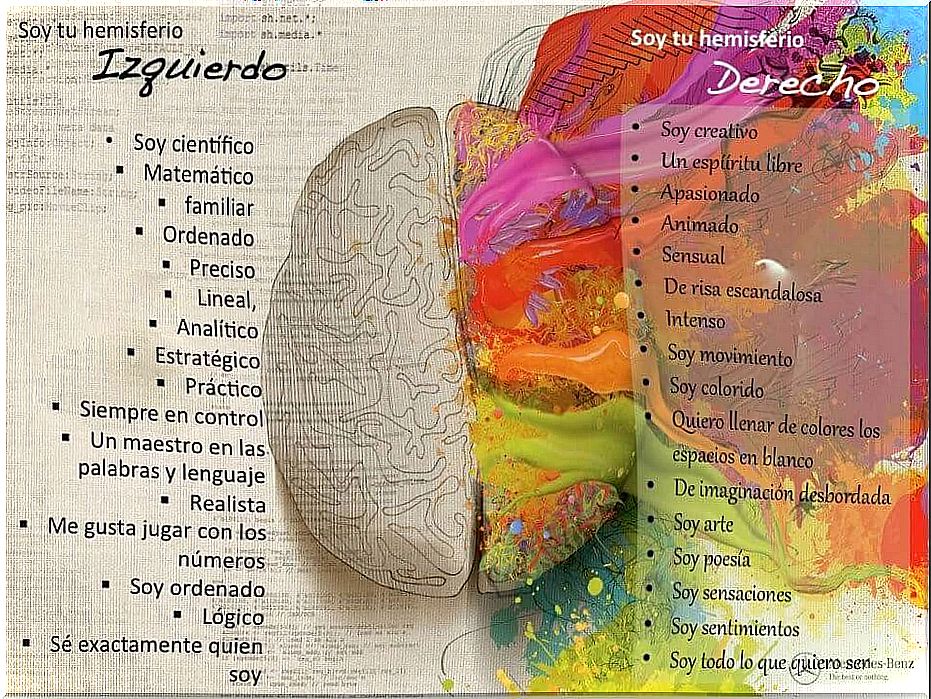Brain Hemispheres And Personality: A Myth?
Until a few years ago, it was believed that there was a relationship between the cerebral hemispheres and the personality. Thus, in general terms, it was stated that if a person “developed” one hemisphere more than the other, they would have more facilities for science or the arts.
Therefore, people could be classified into “artistic” and “scientific”. Each group was attributed a series of characteristics and, as it is possible to intuit, there was no middle ground.
So it was easy to fall for etiquette and self-fulfilling prophecy: I’m bad at math; that means that my left hemisphere is less developed. Therefore I have more artistic or literary tendencies.
Nowadays, thanks to science, the relationships between the cerebral hemispheres and the personality have been partially revealed. Nothing is as we thought we knew.
Characteristics for each of the cerebral hemispheres
- Right hemisphere: it is associated with creativity, intuition, passions, art, emotions and feelings. Therefore, artistic, sensitive, detail-oriented people belong to this group.
- Left hemisphere: it is associated with logic, order, science, the capacity for reflection, analysis and control. Therefore, practical and organized people belong to this group.

Based on this, a relationship was also established between the “objective” and the “subjective” ; the first being understood as something cold and calculating and the second as something emotional, sensitive. Therefore, generalizations such as:
- People with a more developed right brain have much more emotional intelligence than people with a developed left side.
- Artistic people, due to their type of hemispheric development, tend to be more subjective and emotional. Among many other statements of the kind.
Now what does the science say to all of this? Is there really a relationship between the cerebral hemispheres and the personality? How easy was the research work to find out? Let’s see it next.
The work of scientists
At the University of Utah, a group of scientists specializing in Neuroscience, led by Jeff Anderson, decided to conduct an experiment. They took a large sample of people and performed various brain scans. This allowed to show that there is no evidence of Functional Magnetic Resonance that proves the predominance of one hemisphere of the brain over the other.
The Anderson-led study was based on the use of Functional Magnetic Resonance (known as MRI ). This test allowed us to analyze the brain activity at rest and thus find a correlation between the regions of the brain, which was divided into 7000 zones.
By examining the most lateralized brain regions and looking for connections and combinations, the scientists concluded that, if there was a connection that lateralized to the left, there should also be a connection that was completely lateralized to the right; thus provoking opposite pairs of connections.
One of the data that can be highlighted from the study is that, although the language is located on the left and the center of attention on the right; This is not to say that people have a mostly left or right neural network.

At the end of the experiment, the long-held theory of the predominance of one brain hemisphere over the other ended up being discredited.
Anderson’s conclusion
Anderson concluded that, by not having detected patterns that show that one hemisphere has greater government than another over the neural network, it is most likely that the personalities have no relationship whatsoever with the activity or connection between the hemispheres.
Undoubtedly, the experiment allowed to cast doubt on those claims that people’s personality was based on the development of one of the cerebral hemispheres. And over time, other researchers confirmed that, indeed, the relationship between the cerebral hemispheres and personality was nothing more than a myth.
So now you know, the next time you wonder why you have good math or arts skills, you should probably attribute your skills to your own tastes or social settings, since neuroscientifically speaking, it seems that the hemispheres of your brain do not have nothing to do with it.









